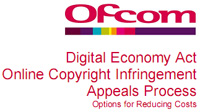UK Govt. Censors Concerns of Erroneous Piracy Allegations: “
Yesterday the UK government announced that following a report from regulator OFCOM, plans to block alleged copyright-infringing websites would be dropped. However, there was a second report where OFCOM detailed ways of keeping the costs of Digital Economy Act infringement appeals down. The document carried the usual redactions but TorrentFreak has put on its X-ray vision for your viewing pleasure.
 Yesterday, detailing the government’s response to the Hargreaves report, business secretary Vince Cable confirmed that the website blocking provisions put in place under the controversial Digital Economy Act will be discontinued. The decision coincided with an OFCOM report which noted that website blocking would not be effective.
Yesterday, detailing the government’s response to the Hargreaves report, business secretary Vince Cable confirmed that the website blocking provisions put in place under the controversial Digital Economy Act will be discontinued. The decision coincided with an OFCOM report which noted that website blocking would not be effective.
OFCOM also released a second report titled Digital Economy Act, Online Copyright Infringement Appeals Process: Options for reducing costs.
On the front page of the report there is a note that redactions have taken place to censor sections relating to ‘on-going policy development’ of the Department of Culture, Media and Sport.
The DCMS did a better job of hiding the blacked-out text than earlier in the week but not so good as to keep out TorrentFreak and our X-ray specs.
The first redaction on Page 3 says simply ‘Revisit the grounds for appeal set out in Ofcom’s draft Initial Obligations Code’ but two pages later things start to get much more interesting. It seems the government (or more likely their friends in the copyright lobby) doesn’t want talk of an error-prone system becoming public.
Page 5 – OFCOM wants rights holders’ accusations to be ‘quality assured’
Ofcom has also sought to ensure efficiency by introducing into the Code a requirement that Copyright Owners take part in a quality assurance process with the aim of minimising errors. This should help to reduce the number of wrongly identified infringements and subscribers. (ISPs can also have some impact here by ensuring that the letters they send to subscribers make clear the implications of receiving a notification).
A ‘quality assurance process’ sounds like a great idea, but who could be trusted to implement such a regime and ensure independent scrutiny? Anti-piracy tracking companies are notoriously secretive and unlikely to be open about the short-comings of their ‘proprietary systems’.
Page 11 – Government rejects OFCOM suggestion of subscriber appeal ‘on any reasonable grounds’
The grounds set out in the Act are non-exhaustive and we reflected this in our drafted Code by including an option to appeal on ‘any other reasonable ground’. This was intended to provide an efficient mechanism through which to avoid a lengthy revision of the Code should subscribers find additional, but reasonable, grounds for appeal as technologies and consumer behaviours evolve.
We understand that Government believes we should not include this mechanism in the final Code
It is far from clear why the government wishes to remove the right for a citizen to appeal a wrongful accusation on ‘any reasonable ground’. What is clear, however, is why the government might wish to redact this statement from the report – it looks very bad indeed.
Page 11 – ISP IP address matching to be ‘quality assured’
We have also introduced into the Code a requirement that Copyright Owners take part in a quality assurance process with the aim of minimising errors. We are proposing to sponsor a similar standard for the IP address matching processes of the ISPs, although participation will be voluntary. This should help to reduce the number of wrongly identified infringements and subscribers (appeal grounds (a) and (b)). We anticipate that the majority of appeals will rely on ground (c) in the absence of systematic failures by a Copyright Owner or ISP under the Code.
When it comes to copyright infringement cases ISPs make errors so it is good they will be required to adopt similar ‘quality assurance’ processes as rights holders. However, how many will choose to do so when participation is voluntary remains to be seen.
Redactions on page 17 merely repeat details covered in earlier redactions. Redactions on page 19 likewise, save a comment that a rightsholder ‘quality assurance’ process
….does not create a rebuttable presumption in favour of the rights holder but should help bring down the proportion of incorrect CIRs [Copyright Infringement Reports] and therefore appeals costs since there are likely to be fewer meritorious appeals in this respect. This quality assurance is also intended to make sure that the number of CIRs rejected by ISPs for process reasons is minimised
The full but redacted document can be downloaded here.
Source: UK Govt. Censors Concerns of Erroneous Piracy Allegations
“
(Via TorrentFreak.)